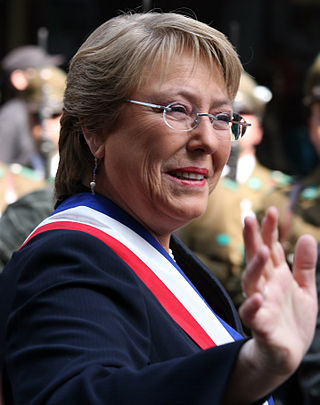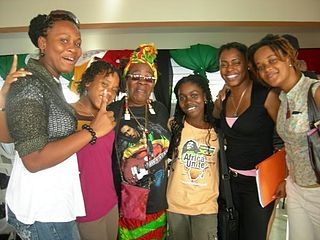Related Research Articles

Marriage, also called matrimony or wedlock, is a culturally and often legally recognised union between people called spouses. It establishes rights and obligations between them, as well as between them and their children, and between them and their in-laws. It is nearly a cultural universal, but the definition of marriage varies between cultures and religions, and over time. Typically, it is an institution in which interpersonal relationships, usually sexual, are acknowledged or sanctioned. In some cultures, marriage is recommended or considered to be compulsory before pursuing sexual activity. A marriage ceremony is called a wedding, while a private marriage is sometimes called an elopement.

A spouse is a significant other in a marriage. The word 'spouse' can only ever be used when a couple is married legally or by common law. A male spouse is called a husband while a female spouse is called a wife.
A gender role, or sex role, is a set of socially accepted behaviors and attitudes deemed appropriate or desirable for individuals based on their gender or sex. Gender roles are usually centered on conceptions of masculinity and femininity.

A wife is a woman in a marital relationship. A woman who has separated from her partner continues to be a wife until their marriage is legally dissolved with a divorce judgment. On the death of her partner, a wife is referred to as a widow. The rights and obligations of a wife to her partner and her status in the community and law vary between cultures and have varied over time.
A widow (female) or widower (male) is a person whose spouse has died and has usually not remarried. The male form, "widower", is first attested in the 14th century, by the 19th century supplanting "widow" with reference to men. The adjective for either sex is widowed. These terms are not applied to a divorcé(e) following the death of an ex-spouse.
The men's rights movement (MRM) is a branch of the men's movement. The MRM in particular consists of a variety of groups and individuals known as men's rights activists (MRAs) who focus on social issues, such as specific government services, which adversely impact, or in some cases, structurally discriminate against, men and boys. Common topics discussed within the men's rights movement include family law, such as child custody, alimony and marital property distribution; reproduction; suicide; domestic violence against men; false accusations of rape; circumcision; education; conscription; social safety nets; and health policies. The men's rights movement branched off from the men's liberation movement in the early 1970s, with both groups comprising a part of the larger men's movement.

Sex segregation, sex separation, sex partition,gender segregation,gender separation, or gender partition is the physical, legal, or cultural separation of people according to their gender or biological sex at any age. Sex segregation can simply refer to the physical and spatial separation by sex without any connotation of illegal discrimination. In other circumstances, sex segregation can be controversial. Depending on the circumstances, it can be a violation of capabilities and human rights and can create economic inefficiencies; on the other hand, some supporters argue that it is central to certain religious laws and social and cultural histories and traditions.

Hypergamy is a term used in social science for the act or practice of a person dating or marrying a spouse of higher social status or sexual capital than themselves.

Remarriage is a marriage that takes place after a previous marital union has ended, as through divorce or widowhood. Some individuals are more likely to remarry than others; the likelihood can differ based on previous relationship status, level of interest in establishing a new romantic relationship, gender, culture, and age among other factors. Those who choose not to remarry may prefer alternative arrangements like cohabitation or living apart together. Remarriage also provides mental and physical health benefits. However, although remarried individuals tend to have better health than individuals who do not repartner, they still generally have worse health than individuals who have remained continuously married. Remarriage is addressed differently in various religions and denominations of those religions. Someone who repeatedly remarries is referred to as a serial wedder.

Women in Lebanon are treated according to patriarchal norms although the legal status of women has improved since the 20th century. Gender equality in Lebanon remains problematic. Active feminist movements exist in Lebanon which are trying to overcome the legal and sociopolitical discrimination enshrined in law.

The lives, roles, and rights of women in Chile have gone through many changes over time. Chilean women's societal roles have historically been impacted by traditional gender roles and a patriarchal culture, but throughout the twentieth century, women increasingly involved themselves in politics and protest, resulting in provisions to the constitution to uphold equality between men and women and prohibit sex discrimination.
Criticisms of marriage are arguments against the practical or moral value of the institution of matrimony or particular forms of matrimony. These have included the effects that marriage has on individual liberty, equality between the sexes, the relation between marriage and violence, philosophical questions about how much control can a government have over its population, the amount of control a person has over another, the financial risk when measured against the divorce rate, and questioning of the necessity to have a relationship sanctioned by government or religious authorities.

The legal status of polygamy varies widely around the world. Polygamy is legal in 58 out of nearly 200 sovereign states, the vast majority of them being Muslim-majority countries. Some countries that permit polygamy have restrictions, such as requiring the first wife to give her consent.
Traditionally, women in Hong Kong have been situated within the context of Chinese family and society, in which they were treated the same as Mainland women or Taiwanese women. However, there are cultural differences between Mainland Chinese citizens and citizens of Hong Kong. During the British colonial period, the emergence of Western culture created a mix of traditional Chinese culture and Western values. This created a unique culture of Hong Kong. Along with the rapid economic and social development of Hong Kong since the end of the Second World War, there has been a significant improvement in the social status of women. However, the male-dominant social structure still persists in some aspects of women's lives.

Women in Madagascar generally live longer than men, whom they outnumber. Marrying young, they are traditionally subservient to their husbands. Roughly a third have their first child before the age of 19, and those who wish to delay having children may not have access to contraceptives. Although it is illegal with no exceptions, abortion is common, with an estimated 24 percent of women having had one. While they are constitutionally equal to men, they have unequal property rights and employment opportunities in certain areas.
Women's education in Pakistan is a fundamental right of every female citizen, according to article thirty-seven of the Constitution of Pakistan, but gender discrepancies still exist in the educational sector. According to the 2011 Human Development Report of the United Nations Development Program, approximately twice as many males as females receive a secondary education in Pakistan, and public expenditures on education amount to only 2.7% of the GDP of the country. The unemployment rate of female graduates in Pakistan is approximately 3.8 times higher than that of their male counterparts.

Women in Bulgaria refers to women who live in and are from Bulgaria. Women's position in Bulgarian society has been influenced by a variety of cultures and ideologies, including the Byzantine and Ottoman cultures, Eastern Orthodox Christianity, communist ideology, and contemporary globalized Western values.

Women in Trinidad and Tobago are women who were born in, who live in, or are from Trinidad and Tobago. Depending from which island the women came, they may also be called Trinidadian women or Tobagonian women respectively. Women in Trinidad and Tobago excel in various industries and occupations, including micro-enterprise owners, "lawyers, judges, politicians, civil servants, journalists, and calypsonians." Women still dominate the fields of "domestic service, sales, and some light manufacturing."
Califano v. Goldfarb, 430 U.S. 199 (1977), was a decision by the United States Supreme Court, which held that the different treatment of men and women mandated by 42 U.S.C. § 402(f)(1)(D) constituted invidious discrimination against female wage earners by affording them less protection for their surviving spouses than is provided to male employees, and therefore violated the Due Process Clause of the Fifth Amendment to the United States Constitution. The case was brought by a widower who was denied survivor benefits on the grounds that he had not been receiving at least one-half support from his wife when she died. Justice Brennan delivered the opinion of the court, ruling unconstitutional the provision of the Social Security Act which set forth a gender-based distinction between widows and widowers, whereby Social Security Act survivors benefits were payable to a widower only if he was receiving at least half of his support from his late wife, while such benefits based on the earnings of a deceased husband were payable to his widow regardless of dependency. The Court found that this distinction deprived female wage earners of the same protection that a similarly situated male worker would have received, violating due process and equal protection.
Gabonese nationality law is regulated by the Constitution of Gabon, as amended; the Gabonese Nationality Code, and its revisions; and various international agreements to which the country is a signatory. These laws determine who is, or is eligible to be, a national of Gabon. The legal means to acquire nationality, formal legal membership in a nation, differ from the domestic relationship of rights and obligations between a national and the nation, known as citizenship. Nationality describes the relationship of an individual to the state under international law, whereas citizenship is the domestic relationship of an individual within the nation. Gabonese nationality is typically obtained under the principle of jus soli, i.e. by birth in Gabon, or of jus sanguinis, born to parents with Gabonese nationality. It can be granted to persons with an affiliation to the country, or to a permanent resident who has lived in the country for a given period of time through naturalization.
References
- ↑ "Gender Equality and Social Institutions in Gabon". Social Institutions & Gender Index, genderindex.org. 2007. Archived from the original on 2010-06-19. Retrieved 2009-04-27.